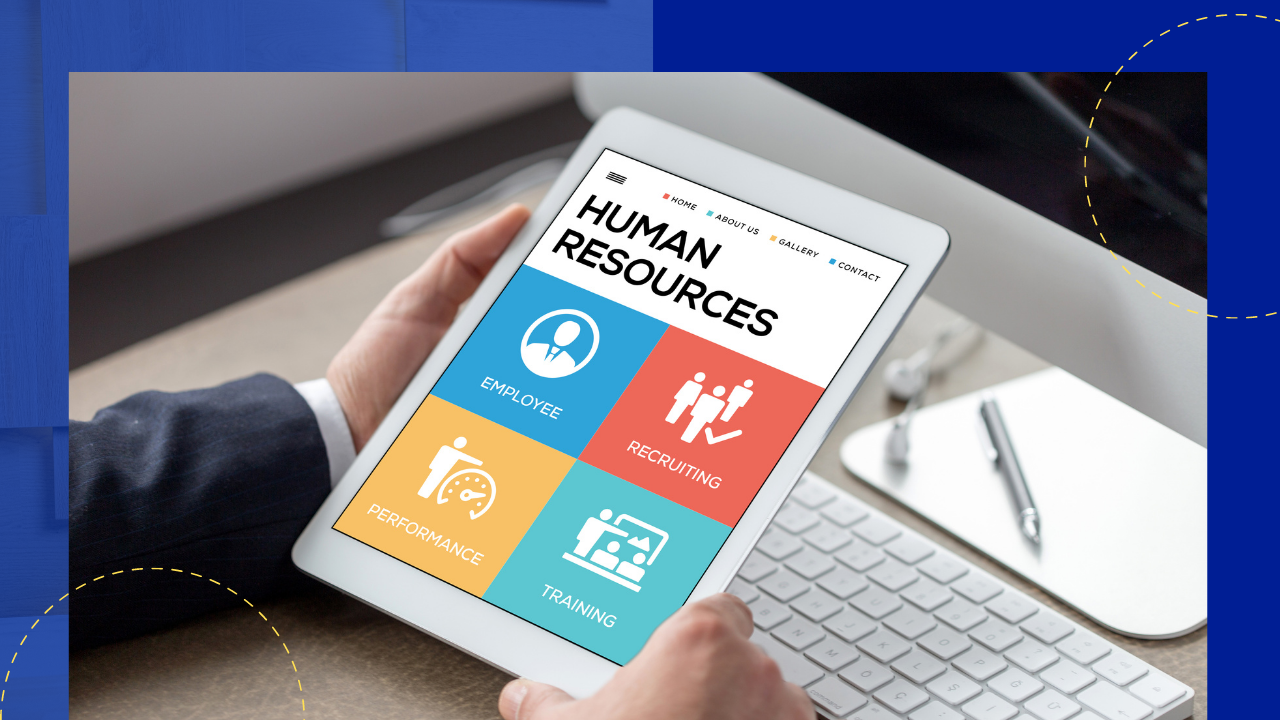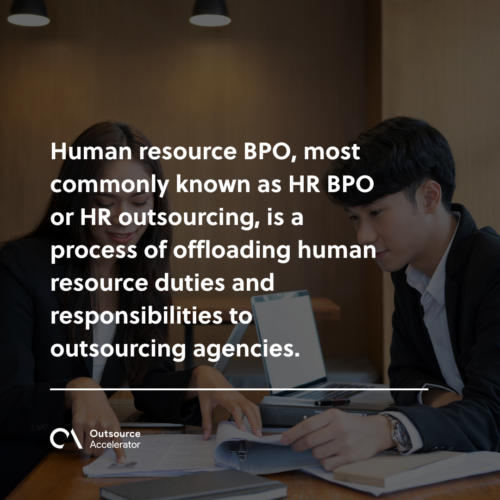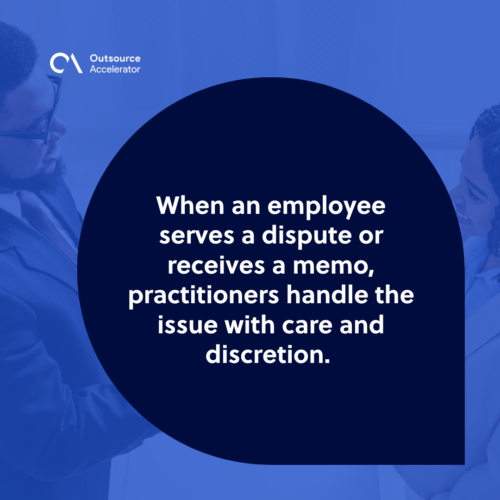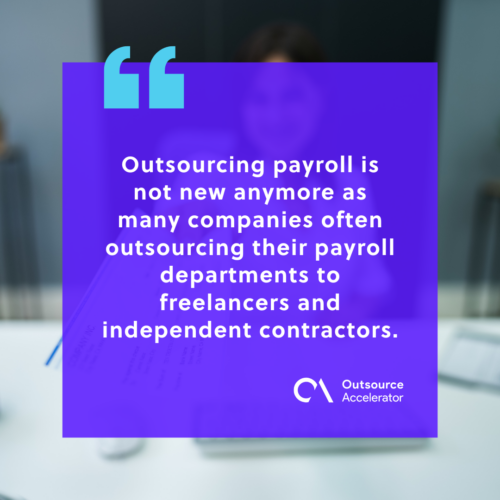Outsourced Human Resources 101

Human resources handle the welfare of the employees, where they get involved in recruitment, hiring, onboarding, training, up to payroll. They keep the office environment stable and are a crucial part of a business especially when they grow and hire more people.
While established enterprises have built their internal HR department, startups often have a limited budget to hire their own team. They need to break the bank to provide the resources needed.
Good thing there’s another way to comply with their needs, which is through business process outsourcing.
Human resources is one of the most important departments in an outsourcing company. HR practitioners often come up with plans and strategies that will make the workplace easier to navigate.
The HR practices in the BPO sector may be different from the “traditional” setting. The processes may be more rigid and less lenient than others may think.
Defining HR Business Process Outsourcing
Human resource BPO, most commonly known as HR BPO or HR outsourcing, is a process of offloading human resource duties and responsibilities to outsourcing agencies.
From sourcing, hiring, onboarding, to firing and terminating, outsourced HR duties encompass what in-house human resource departments do. The only difference is that the parent company will be partnering up with an outsourcing firm.

What are the five main areas of HR?
These five main areas of human resources will always be the same—no matter if it’s in-house or outsourced.
According to Lumen Learning, these five phases of HR services serve as the core of the department. Without these, human resource activities would see no traction nor improvements in the time being.
Staffing
Consider staffing as sourcing for candidates, hiring new employees, and interviewing them. HR personnel does the staffing according to the business need and the current headcount
Some clients outsource their staffing efforts to recruitment agencies and firms, letting them handle the first cycle of recruitment.
Development
Onboarding and training are part of the development phase of human resources.
These two are pertinent to new hires as onboarding will allow them to adjust to the company’s culture and their respective departments.
Almost everyone knows that when onboarding new hires is done right, it will pay off in the long run.
Compensation
Benefits come in the form of salary, non-taxable allowance, transportation allowance, and rice allowance, among others.
Some more “exciting” forms of benefits are account-specific bonuses and end-of-the-year prorated compensation, e.g 13th, 14th, and 15th-month pay.
While payroll handles the distribution of monetary incentives, the HR department usually handles the specifications of each compensation package.
Safety and health
The human resource department handles all employee concerns, including their health and safety in the workplace.
For instance, the department will be responsible for implementing safety precautions if and when the company has decided to go back to the office after the mandatory lockdowns are over.
They handle orders from the government about safe working practices, especially if the industry they are in is heavy on human labor.
Employee and labor relations
Disagreements between employees can’t be avoided. But what the HR department can do is to mediate the situation and deescalate the tension.
When an employee serves a dispute or receives a memo, practitioners handle the issue with care and discretion.
The department also serves as the voice of the employees on behalf of any major changes in the company.

Why outsource HR
Outsourcing companies made their services available for SMEs with the help of easy access to technology. This became perfect, especially for those whose employees grow in numbers.
There are different reasons why a business outsources HR services:
- To cut costs. Primarily, they outsource to cut costs on labor and resources. For startups, hiring in-house employees can be expensive since they only have a limited budget.
- To establish a more diverse network. Outsourcing doesn’t just give them the chance to hire local employees. Instead, they have a wide range of talents to choose from.
- To expand the business more easily. Outsourcing HR services enables them to scale their employees easily. This gives them the flexibility to employ teams for other functions.
- Better documentary and tax compliance. They are experts in handling and filing documentary requirements, particularly employees’ social security and tax documents. Employers can assure that these teams do it with high accuracy and fewer errors to prevent penalties.
- Software-as-a-Service (SaaS) advantage. These teams use different software for better HR management. With SaaS, they can streamline their duties such as payroll, onboarding, and training in one place.
- Additional employee benefits. With outsourcing HR, employers may even get the opportunity to expand the benefits they give to their employees. It can include life insurance policies, wellness training, retirement plans, and bigger bonuses and incentives.
HR outsourcing: The future in the BPO industry
The human resource in the outsourcing industry is a thriving subsector.
There’s no doubt that outsourcing some HR functions to outsourcing agencies will pay off in the long run.
While some might think that outsourcing services may be a wrong decision, it still boils down to the culture and the path that the company will take in the near future.
It’s true that some core functions can’t be or shouldn’t be outsourced, it still is the company’s decision whether they’re going to offload responsibilities or not.
What is the HR process?
HR outsourcing, just as its name suggests, pertains to the process of offloading HR services to an external third party. As discussed in the beginning, this whole operation is important to any and every organization out there.
According to an article published by UK-based HR website Personnel Today, “The operation of any HR outsourcing arrangement should be governed by a service level agreement. This will define the required standards of performance by both parties and any penalties for non-compliance.
The article also highlighted the importance of a service level agreement, adding that it “must be negotiated with great care to mitigate the above risks.”
HR services you can outsource to BPOs
With the service level agreement on course and on par with both parties, it’s time to look for HR service that you can offload with no worries.
Recruitment
From job postings to interviewing potential candidates, recruitment is a whole process in and of itself already.
The RPO subsector
Recruitment process outsourcing is a relatively “young” subsector of the HRO industry. This refers to the act of outsourcing any and every recruitment effort to external service providers.
Payroll
Outsourcing payroll is not new anymore as many companies often outsourcing their payroll departments to freelancers and independent contractors.

Background checking
As simple as it sounds and yet it can make or break someone’s employment contract, background checking is another HR service that you can outsource.
Temporary staffing
Temporary or seasonal staffing is a practice that certain industries do—especially during the peak seasons of holidays. The retail industry is known for its temporary staffing processes.
Human resource outsourcing innovates with any company it lodges itself into. It’s a sub-industry that works in so many different ways that each department in the HR outsourcing department is a tight-knit community of professionals growing together.
HR outsourcing companies
India and the Philippines are among the most popular countries to outsource processes, especially HR management.
The West goes to these countries because of cheap labor costs, high-quality equipment, strong English proficiency, and 24/7 service. The Top BPO companies in these countries, especially the Philippines, guarantee the best service for their clients anytime they need it.







 Independent
Independent




